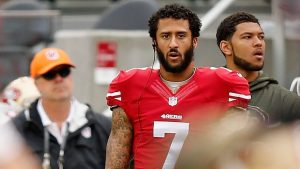(Akiit.com) A bold but simple gesture by San Francisco 49ers quarterback Colin Kaepernick has catapulted him into the public spotlight for something other than his athletic prowess, stoking what some describe as controversy while generating support and considerable anger in some corners.
His decision to sit and then kneel during the national anthem earlier this year, and his reasons for doing so, has caused a groundswell of national discussion around race, justice and equality, as well as resentment and criticism from those who disapprove of Kaepernick’s action.
This young man mirrors other athletes from the recent past who, because of the racial and social inequalities around them, became social and political activists. This includes Muhammad Ali, Billy Jean King, Jim Brown, Arthur Ashe, Althea Gibson, Kareem Abdul Jabbar, Bill Russell, John Carlos and Tommie Smith.
As an activist and the representative of an activist civil rights organization, what we see in people’s reaction to this issue speaks to  the necessary role social critics and advocates play and the discourse that must take place in a country wracked by issues of race, class, gender disparities and wealth imbalances.
the necessary role social critics and advocates play and the discourse that must take place in a country wracked by issues of race, class, gender disparities and wealth imbalances.
What I find interesting and most troubling is that rather than respond to Colin Kaepernick’s protest of the extrajudicial killings of primarily unarmed Black men, women and children, the over-policing of Black and Brown communities, police harassment and brutality and racial injustice in the United States, his critics have opted to ignore the substance of his critique and latched onto his supposed disrespect for the flag and anthem.
Although there is an appreciation and even a kind of veneration by most Americans for what students and civil rights activists did in the 1960s, this country has a history of pushback against civil rights protests and demonstrations. Perhaps nothing better demonstrates that dynamic than the 1960s.
Surveys and other data show that traditional Civil Rights and student activists were not embraced by the larger community. They encountered pervasive disapproval and criticism. Then, as now, the majority of Americans believed that these protests would hinder, not advance, African Americans’ struggle for equality. In fact, a survey of pastors and churches found that only 13 percent of them supported the Rev. Dr. Martin Luther King during the height of the Civil Rights movement.
History has shown that most mass movements never started with a large assemblage of followers. Usually, a small band of visionaries met, planned, strategized and implemented actions to reach their desired collective goals. Kaepernick’s experience is no different.
His stand has incited the vitriol of critics who have hammered him as disrespectful, unpatriotic, pampered, ungrateful and racist. Some 49er fans have burned his football jersey and he’s described as the most hated man in the National Football League and seven of 10 National Football League executives told one sports journalist that Colin Kaepernick would be a pariah if he becomes available to be traded. Even his mother tweeted her disapproval.
But Colin Kaepernick has captivated the country and sparked a sometimes intense debate not only about the state of race relations in America, but about what exactly it means to be a patriot. And as Black men and women continue to be killed by police?—most notably Terrence Crutcher in Tulsa and Keith Scott in Charlotte?—?Kaepernick’s initial protest has mutated and spread.
As we move into the heart of the National Football League season, and almost two months after Kaepernick’s principled stand against police brutality and racial injustice, more than four dozen NFL players from 13 professional football teams have sat, knelt, or raised fists during the national anthem on game days. In addition, three teams have held hands or linked arms to show their support and unity in the midst of the heightened racial discord currently wracking our country.
And the list of those joining the movement continues to grow.
The anthem protests have spread beyond the NFL to include at least one entire high school football team, members of marching bands, Howard University cheerleaders and more than a dozen players from three WNBA teams who staged protests during the 2016 playoffs. In addition, U.S. Women’s soccer star Megan Rapinoe took a knee before a women’s professional soccer game, and did the same while playing from for the U.S. national team shortly after. Meanwhile, gold medal swimmer Anthony Ervin raised a fist as the anthem played during a swim meet in Brazil.
Perhaps just as significantly, protests staged during the anthem have occurred in at least 37 high schools, 17 colleges, and two youth leagues in more than 30 states across the United States.
Despite what critics say, Colin Kaepernick is exercising his First Amendment right to freedom of speech. He has a deep desire to make the United States live up to its creed of freedom, equality and justice for all of its citizens, not just for a segment of the populace. It doesn’t matter whether we agree with him or not. He is a man with a conscience and an awareness of what’s going on around him. And he hasn’t allowed the millions he makes to cloud his judgement or to deter him from standing up as an advocate for social justice and change.
Columnist; George H. Lambert, Jr.
Official website; https://www.gwul.org








Leave a Reply